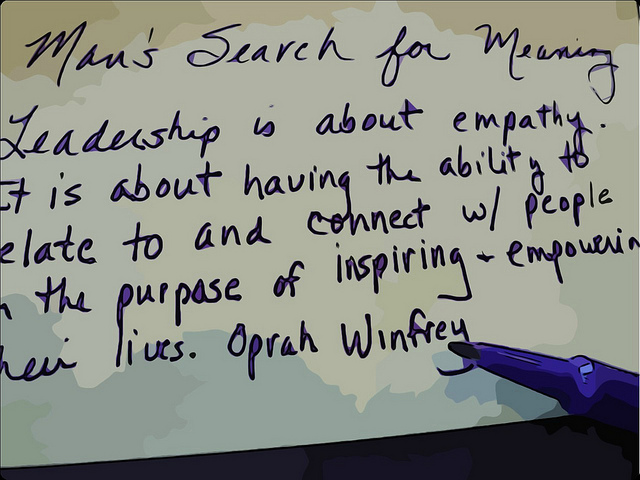
(flickr image by krismc2011)
My first “homework assignment” in the Strategic Leadership Program at Loyola was to take an emotional IQ test. It’s fair to say I hate these tests. I avoid them like the plague and have even offered to resign instead of taking them before. What causes such an adverse reaction? Perhaps it’s my inner control freak or perhaps I would just rather someone take the time to get to know me instead of testing me. Regardless of my objections ( and due to my desire to be a star pupil) I took the assessment and anxiously awaited the results. The results showed that I was a strong leader with a high emotional IQ but it also showed I lacked in two key areas. The first, impulse control. This didn’t freak me out, I’m a “go with your gut” kind of leader and anyone who’s seen me near red velvet cupcakes can attest to my lack of impulse control. The second was empathy. This one shocked me. Could my tell it like it is, always know where you stand, ask forgiveness not permission attitude really mean that I lacked empathy as a leader. Turns out this test might have been on to something.
I, like many of my classmates, were relieved to learn that I wasn’t the only leader in the group that struggled with empathy. So why is leading with empathy so important? Here’s what we learned:
Empathy makes you a better boss
Likely we’ve all worked for a boss that doesn’t understand that you have a life outside of the office. They have no care or concern for external factors that may be standing in the way of your success. The “just get it done” attitude makes for a difficult working relationship. Leading with empathy means understanding that life and it’s roadblocks happen. True leadership is guiding your team through it and building success despite the roadblocks.
Empathy doesn’t make you weak
There’s a big difference between accepting excuses or whining and being empathetic. This is a trap I often fall into. I hate people who whine constantly about how hard things are. I prefer to work with the “just get it done” type of people but there’s a middle ground. Setting the standard that whining isn’t allowed but addressing challenges and finding solutions is rewarded will make all the difference in your team.
Empathy paves the way for others to be successful
Leadership is not about moving your own career ahead, it’s about helping others find their way. I’ve started substituting “understanding” for “empathy” in my mind and it’s helping me motivate my team. You can still set a high standard for yourself and others while being understanding of the obstacles that stand in the way. When we lead our team to find solutions instead of complaints we demonstrate both leadership and empathy.
Empathy energizes the team
People do business with people they like. Not only do they do business with people they like but they also go the extra mile for people they believe understand them and want to see them succeed. By showing empathy to our team we create a corporate culture that energizes people and encourages others to go the extra mile.
Judy Braun of Braun Leadership Consulting lead the Loyola session Foundations of Effective and Reflective Strategic Leadership. If you have the opportunity to work with Judy, take one of her classes, or hire her for professional development of you or your organization, I highly encourage you to do so. Judy is hands down one of the best instructors I’ve ever had the chance to learn from.
Related articles
- The Neuroscience of Empathy (psychologytoday.com)
- Empathy: Why is it important for leaders? (petergagliardo.wordpress.com)


